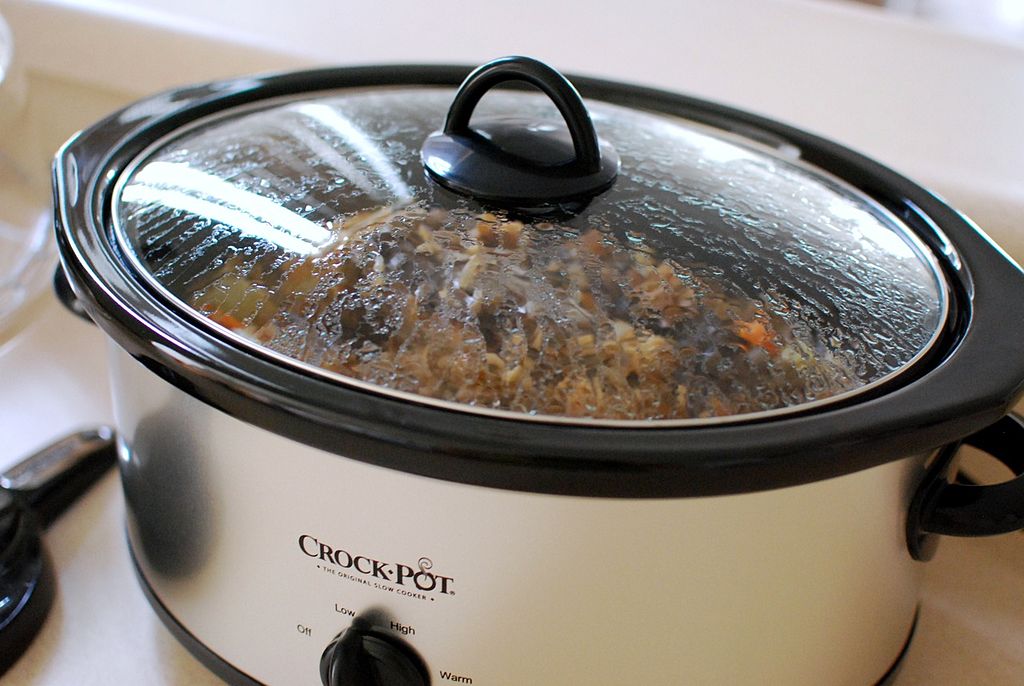Slow cookers have truly been around– specifically, since 1940. The slow cooker was initially invented to help Jewish folks cook a special dish called the cholent, a type of stew consumed by Jews during the Sabbath. Slow cookers are used not just for cooking but for keeping food warm for extended periods.
Slow cookers were also extremely useful for modern office folk who didn’t have the energy to cook a full meal when they got home. It was one of those gadgets that fit into the fast-paced, modern lifestyle, specifically by being ‘slow’ cooking. But are these miracle cookers efficient? Will you end up spending a lot of money on electricity if you cook with slow cookers more often?
Do Slow Cookers Take Up A Lot Of Electricity?
Slow cookers don’t consume more electricity than other cooking appliances. The power rating depends on the vessel measurement or the size of the slow cooker. The bigger the slow cooker, the more heating elements required to heat the entire vessel, and the more power you need to cook for a long time.
However, it would be wrong to think that slow cookers will guzzle power at their max power rating. For example, if the power rating is 150 watts, it is possible that if you place the slow cooker at the lowest setting, the actual power consumption will have reduced to 30 watts.
Multiply this by the number of hours needed to cook a pork roast, for example, you get the actual power consumption. We should also consider the context of power consumption and why the appliance is used in the first place. Suppose a slow cooker is employed as a portable food warmer for a picnic or get-together. In that case, if it runs for fifteen hours at 35 watts, it’s still not a pricey appliance based on the power consumption because it is continuously warming food at the bare minimum power setting. Another important factor is how much food you are cooking. Three quarts of food that needs to be cooked for about eight hours on a 200-watt slow cooker will require only 1.6kWh of power.
Are Slow Cookers Cheaper to Run Than Ovens?
On the whole, slow cookers are more efficient than electric ovens because the general energy requirement is much lower than electric ovens. Slow cookers require energy that is comparable to the energy required by electric light bulbs. There are slow cooker models that need just 75 watts of power, up to around 300 watts. Electric ovens, on the other hand, regularly run from 1000 watts to 3000 watts. However, we also have to put things into context as to how these devices run. Electric ovens don’t have their heating elements on the entire time. When the desired temperature is attained, electric ovens will turn off their heating elements until such time that the temperature drops again. Essentially, electric ovens will only have their heating elements on 25% of the entire cooking time.
Slow cookers are the direct opposite of electric ovens in this respect. Slow cookers are known for having their heating elements activated from start to finish (of the cooking process). The heating element of slow cookers is high at least 50% of the time during the entire cooking process to maintain the ideal cooking temperature. Slow cookers may look like they save a lot of power, but the amount of time can be a big factor.
These facts tell us that if we compare the actual consumption of both appliances, they’re not far off from each other at all. So if you are in an “either, or” situation, you can get both appliances. There are things you can’t do in an electric oven, and vice versa. Additionally, you can’t use an electric oven as a portable food warmer.
Is A Slow Cooker Economical to Use?
Slow cookers are economical to use because they only require the minimum wattage to work. They won’t burn through your pocket with a 3000-watt power requirement. We recommend getting different kinds of slow cookers so you can use the most appropriate one for each cooking need.
The wattage requirement of slow cookers increases as the capacity of the slow cookers increase, too. Basically, the larger the slow cooker, the more energy you need to cover all of the vessel’s space. There are small, lower-capacity slow cookers, medium-sized slow cookers, and the really big ones for large groups of people.
Buying more than one size can save you time because if you are only preparing a small quantity of food, you don’t need to use a large slow cooker. Of course, you can always fill a large slow cooker just ¼ of its capacity, but that won’t change the electrical requirement as the space that needs to heat up is much larger.
Modern slow cookers are also more efficient than the classical ones from several decades ago because they have electronic temperature testing and adjustments.
Suppose you set the slow cooker’s temperature just right, and you don’t overdo the cooking time. In that case, a slow cooker’s efficiency is at least equal to the efficiency of an electric oven that has been cleaned well and has been insulated properly. There will be additional factors at play here, such as the type of slow cooker you have and how old it is.
While the rustic charm of a slow cooker from the 1980s makes it appealing to work with more vintage appliances, do check out the power requirement and test how efficient the appliance is, still. Because if you want to save money on utility bills, it’s best to work with efficient heating elements that get the job done with less time and power. Because it’s not just watts that rack up the bills, it’s the combination of the average power consumption plus the time.
Picture from Janine from Mililani, Hawaii, United States, CC BY 2.0, via Wikimedia Commons

